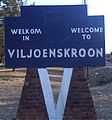Viljoenskroon
| Viljoenskroon | |
|---|---|
 Viljoenskroon | |
| Coordinates: 27°13′S 26°57′E / 27.217°S 26.950°ECoordinates: 27°13′S 26°57′E / 27.217°S 26.950°E | |
| Country | South Africa |
| Province | Free State |
| District | Fezile Dabi |
| Municipality | Moqhaka |
| Area[1] | |
| • Total | 17.9 km2 (6.9 sq mi) |
| Population (2011)[1] | |
| • Total | 31,468 |
| • Density | 1,800/km2 (4,600/sq mi) |
| Racial makeup (2011)[1] | |
| • Black African | 94.2% |
| • Coloured | 0.6% |
| • Indian/Asian | 0.3% |
| • White | 4.6% |
| • Other | 0.4% |
| First languages (2011)[1] | |
| • Sotho | 78.9% |
| • Xhosa | 8.5% |
| • Afrikaans | 5.2% |
| • Tswana | 1.6% |
| • Other | 5.8% |
| Postal code (street) | 9520 |
| PO box | 9520 |
| Area code | 05634 |
| Website | http://www.moqhaka.gov.za/ |
Viljoenskroon is a maize and cattle farming town in the Free State province of South Africa. It was named after the original farm owner JJ Viljoen and his horse Kroon (Crown).[2] The town was laid out in 1921 on the farm "Mahemskuil" and became a municipality in 1925.[3]
The Viljoenskroon municipality and neighboring informal settlement (Rammulotsi) was incorporated into the greater Moqhaka Local Municipality in 1996[4] and forms part of the Fezile Dabi District municipality.
The Viljoenskroon/Rammulotsi urban unit has an estimated population of 59 202.[5] Viljoenskroon historically played a part in providing residential opportunities to the adjacent mining communities at Lace Diamond Mine[6] and the Orkney gold mines.
Schools
There are several schools in the Viljoenskroon area.
Viljoenskroon
Rammulotsi
- Ntsoanatsatsi Middle School (Doubling as a voting station during local and government elections.[8])
- Renyakalletse Public School
- Mphatlalatsane Combined School
Radio Station
The town is home to an Afrikaans language radio station called Overvaal Stereo 96.1FM.[9]
Rammulotsi open-toilet saga
During the May 2011 local government elections, the Rammulotsi open-toilet saga was central to political debate in the Republic of South Africa.[10] The problems experienced with this specific government infrastructure project at Rammulotsi came to light a week before the local elections.[11] It involved 1 831 toilets built by the construction company owned by the husband of then Viljoenskroon mayor, Mantebu Mokgosi.[12] These toilets were not enclosed since construction started in 1995. Initially the ANC was unaware of the problems at Rammulotsi. According to Jackson Mthembu, the party had "evidence that Luthuli House didn’t know there were open toilets in Moqhaka municipality. It wasn’t brought to the attention of the ANC by anybody, not even Sicelo (Co-operative Governance minister),".[13]
The matter was later referred to as the Free State open-toilet saga by the media after the discovery of a similar problem in Tshiame near Harrismith[14] and national political figures such as Julius Malema, Helen Zille and Mangosuthu Buthelezi got involved in the debate. The issue was seen as of national importance by the ANC government which took the Democratic Alliance ruled City of Cape Town to court over the Cape Town open-toilet saga a few months before.[15] In September 2011 Human Settlements Minister Tokyo Sexwale said that the open toilet saga had given politicians leeway to play "political football" when acknowledging that the ruling party was responsible for the open toilets in Rammulotsi and Tshiame.[16] He later appointed ANC stalwart Winnie Madikizela-Mandela to head a national sanitation team consisting of 11 members, including a medical doctor, representatives of the SA Local Government Association, the water affairs department, the SA Municipal Workers' Union and people living in informal settlements to identify irregularities and malpractice, the scale of the problems, nature of sanitation problems and geographic extent...[17]
-

The Viljoenskroon town entrance as seen on the side of the R76 in Engelbrecht street.
-
.jpg)
The Memorable Order of Tin Hats memorial next to the Viljoenskroon town hall.
-

The commemorative plaque on the now demolished "Afrikaner Volkswag" monument commemorating the 150th anniversary of the Great Trek in Faan Röhrich Sports Park, Viljoenskroon.
References
- ↑ 1.0 1.1 1.2 1.3 Sum of the Main Places Rammulotsi and Viljoenskroon from Census 2011.
- ↑ Town Website. April 7, 2011.
- ↑ Routes Travel Info July 28, 2011
- ↑ Municipal Demarcation Board
- ↑ Moqhaka Municipality Website
- ↑ The Lace Project - Diamond Corp PLC
- ↑ Salomon Senekal Hoërskool Website
- ↑ IEC Voting Station ID:44227
- ↑ Overvaal Stereo Website. April 7, 2011.
- ↑ IOL - All it took was 16 years and an election. February 15, 2012.
- ↑ IOL - Heads must roll: Malema. February 15, 2012.
- ↑ IOL - Mayor’s husband linked to toilet saga. February 15, 2012.
- ↑ IOL - ANC shifts blame for open loos. February 15, 2012.
- ↑ IOL - Let toilets ‘die’ of neglect – rather than people. February 15, 2012.
- ↑ Mail & Guardian - Court to rule in Cape Town open-toilet saga. February 15, 2012.
- ↑ IOL - ‘Toilet saga used in political games’. February 15, 2012.
- ↑ Viljoenskroon Website - Toilet saga used in political games. February 15, 2012.
| ||||||||||||||||||||
.svg.png)